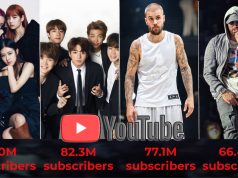“Curtain Call: The Hits” was placed inside the Top 10 of the most successful albums of 2022 in the UK, despite being released 18 years ago. Ranked No.6, the project was the only hip hop record in the Top 20.
One of the most influential British media outlets, The Guardian, published an article that aims to find an explanation to his long-lasting success. But has it delivered the answer?
Having acknowledged that Em’s music gains a massive new audience through the media channels targeting the young demographic, such as TikTok and Fortnite, the author dismisses even a possibility of young people consciously listening to Marshall’s music by providing four (4) quotes from random children age 11-19. Which, of course, were supposed to look more convincing than Em’s 4.4 million followers of his empty TikTok account.
Surprisingly, it seems like the author gives a lot of weight in Em’s current popularity to his fanbase and its online activities:
The real action is in more ageing enclaves of the internet, where Real Rap remains king, vocabulary triumphs over vibes, and comparisons to Shakespeare don’t inspire cringe. The site eminem.news churns out bite-size bits of hagiography every day, and there’s a Reddit community and numerous Facebook fan pages that do a good trade in gossip and nostalgia.
Thanks for the shoutout, but despite all our efforts we do not trick ourselves into believing that people will listen to Eminem because we write about him. On the contrary, we exist only because there are millions of people who listen to his music and want to learn more about the artist behind it. Especially, when this artist doesn’t really bother about maintaining his online and media presence to boost his sales.
What The Guardian has got right is the power of Em’s back catalogue. In the span of his 25 years long career, Marshall has written songs that were tongue-in-the-cheek slaps in the face of societal conformity and hypocrisy, that made fun of the values that were leading the country to degradation, and the songs, which were his sincere confessions and proclamations of perseverance. That is why people listen to them until this day and will be listening for years to come.
But even for this, a respectable paper has its own explanation:
What we’re witnessing, then, is the emergence of a new era of legacy artist, and one shaped acutely by the streaming era. We no longer question the presence of Abba or Elton or Queen collections in end-of-year lists. That roster is expanding, albeit very slowly. Streaming, and the droves of data that it delivers, provides a granular sense of what people are listening to, yet – thanks to editorialised playlists – also skews where our cultural arbiters lie. In the charts, new acts are in constant competition with history.
Some things can be explained by the works of cold streaming algorithms but to dismiss a free will of a listener. And honestly, if you have stopped questioning the presence of Abba or Elton or Queen collections, why Eminem is the one who does not deserve the same treatment? Isn’t it the time to accept that our shared cultural landscape has been shaped by Slim Shady as well as other artists?
You can read this article in full here >>












